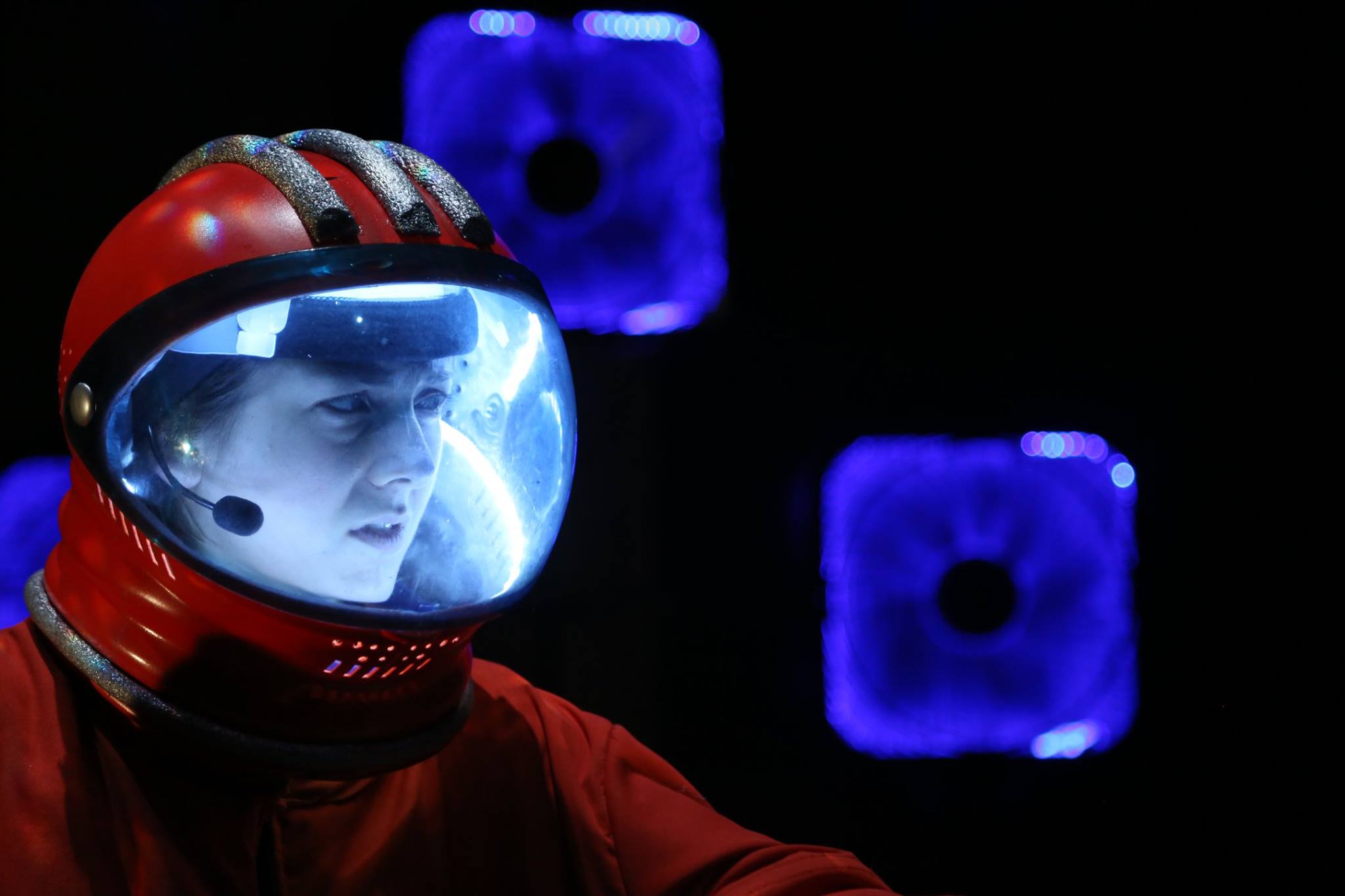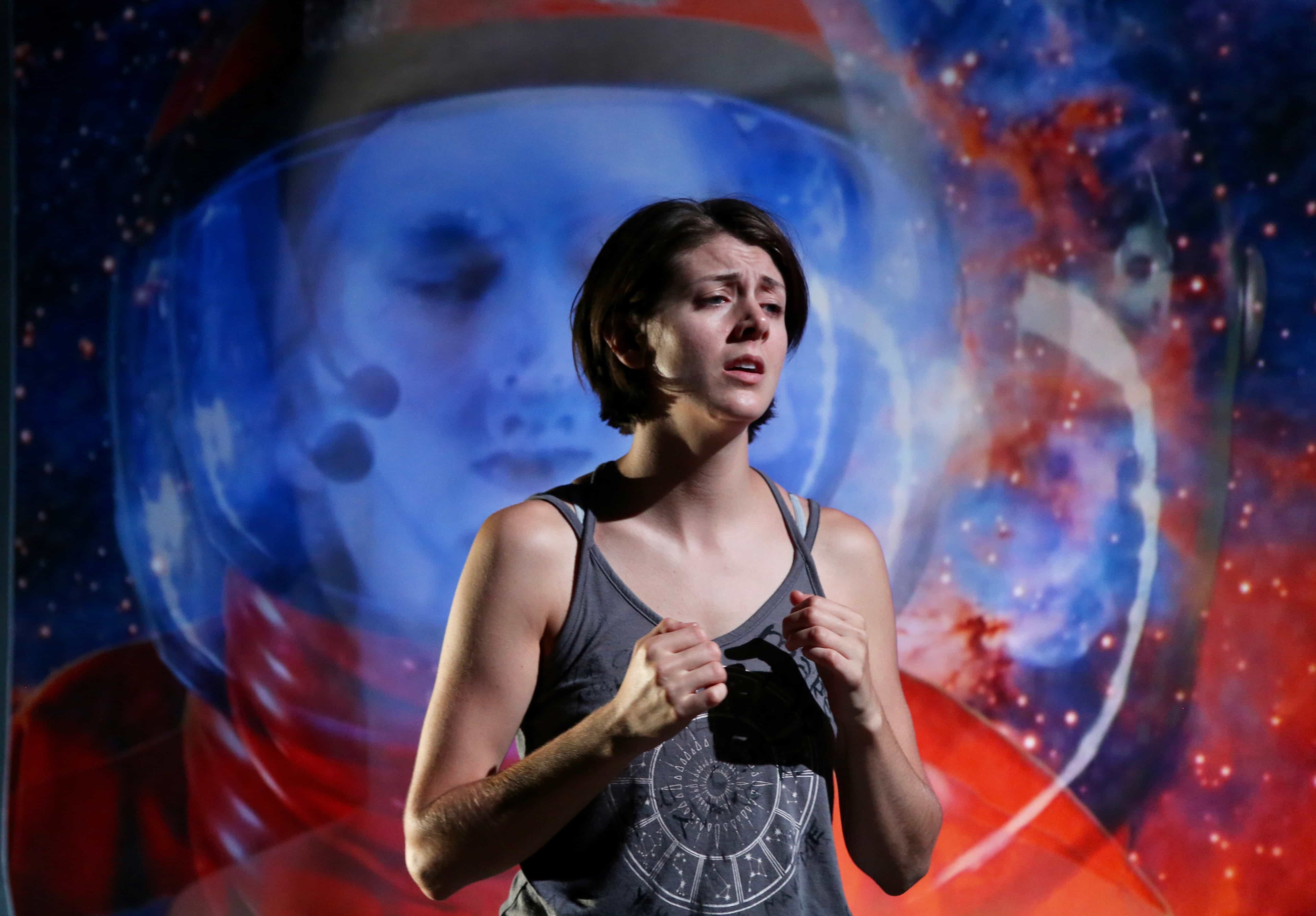Here’s an idea for a grad lit student in search of a dissertation topic: “Bewilderment and Brilliance in the Theater of Kathleen Akerley.” That thought flipped through my head after I watched The Interstellar Ghost Hour, this year’s August offering from Longacre Lea, the artistic home of prolific local playwright and director Kathleen Akerley.
I have followed and written about Akerley’s work for a few years—Fear (2016), the double bill How We Died of Disease-Related Illness and Bones in Whispers (2015), Night Falls on the Blue Planet (2015), and Pol Pot & Associates, LLP (2014)—so I know to expect it to be wildly original, dense with ideas, and cerebrally challenging. That said, I found myself unusually flummoxed by her latest.

On the one hand, if I were given a comprehension quiz about The Interstellar Ghost Hour, I’ve got a feeling I would fail. A young woman named Iris travels through spacetime as an astronaut in order to make peace with her dead parents. She does meet up with them, as she remembers them and as they were before she was born, and she does have strained conversations with them. That much of the play, even though presented as sci-fi, has a recognizable relationship narrative. But along the way, Iris also meets up with a surreal assortment of spectral and telecast figures, ancient and modern, some who show up on a huge television screen, some who appear on stage, and some who transmogrify back and forth. They seem to have no discernible connection to Iris’s motivation to visit her parents in the afterlife. They’re really more like tangential riffs on abstract notions of nourishment and discipline, said to be the sine qua non of good parenting. Plus Iris appears as three different iterations of herself. Next to all this disorientation, Alice’s trip down the rabbit hole was linear lucidity.
Read David Siegel’s review, which gives a terrific overview of all the goings on.
On the other hand, though I was frequently baffled, I felt a hunch that The Interstellar Ghost Hour may be brilliant. Existential insights and aphorisms fly by with dizzying portent, at a speed that’s the consciousness equivalent of film in fast motion. I can’t say I got it, but I would never aver there was nothing to get. So with that in mind, I decided to mine the text for insights into Akerley’s distinctive technique.
What stood out for me first was the richly poetic diction, notably in Iris’s monologs. Here, for instance, is one of the Irises talking about traveling into space. It is lyricism nearly as transporting as the experience she describes:
ALT IRIS: When I left the atmosphere of this planet — I think you understand now how much you don’t understand that sentence — I finally realized there might be nothing in front of me. I might be simply flying out into ice and nothing: no touchstones from astronomy books, no sights that would be alien in their scope but familiar in their beauty, just darkness, ice, and nothing until I ran out of fuel and died in silence. I could’ve turned back right then, I still would’ve been welcome home as an adventurer, it still would’ve made an amazing story. But there’s something in me that was more willing to possibly travel for nothing, into nothing, for all my days remaining nothing, rather than to come back safely and talk about it with my feet on the floor and the sky over my head. The sky is now part of the definition of me, because I grew out of up and down. I’m still in the sky.
Though Akerley is obviously averse to milking moments for their emotion—no sooner has Iris said something touching but what the script skitters off someplace else—there are passages that if time took a breath could break your heart. This is especially true when Iris gives voice to what has been unspoken between her and her parents. Here, in yet another version of herself, Iris addresses her father, who in life was capable of both beating her and tucking her in gently at night:
GHOST IRIS: I loved you. Isn’t that amazing? I loved you when there was no reason to other than I was too small to know how people should behave. I loved you . . . I still love you. But I’m willing to bet you wish I’d mourned you differently. I’m willing to bet if you had a chance you’d hit the restart so you could hug me more often than you hit me, so that I could love you like a daughter and not like a forgiving friend, so that I would have punched the universe in the face to keep it from taking you.
…
[T]here are three versions of you now and I can’t do anything about that but accept it. There’s the guy who did the cruelest things I’ve ever experienced and I don’t know what to think about him, and there’s the you who was my friend but who was still a coward about his mistakes but still, my good friend, and he died, and there’s the you I think you are now, big enough in time and space to be all your good traits and none of your bad, but I can’t ever know that you in human time which means I can’t know that you really at all and I can’t even really be sure, Dad, neither can you, that if you somehow got zapped back into your body you wouldn’t make the same mistakes again. And thanks to you I will always be someone who thinks love is just the tool I have to use to fix a relationship I didn’t ask for and I didn’t break.

The fact that the deep well of emotion I can now read in Iris’s monologs barely registered for me during the performance seems a consequence of Akerley’s skip-to-something-else technique. The script’s brisk rhythm contraindicates empathy with its own main character. This may be inadvertent, but I surmise it is intentional.
The reason I surmise that has to do with the second big thing that stood out for me when I read The Interstellar Ghost Hour. Not only are there quick cuts between scenes (some of which are inexplicable till later); there are literally quick cuts interlinearly. There will be passages of dialog in which the transitional connection between speeches is like a paragraph was excised. Actors of the high caliber Akerley casts presumably fill in the lacunae in rehearsal. But when the scene goes by lickety-split, it can seem like non-sequitur after non-sequitur.
That said, there are shining gems that flicker by—like poetic zingers inviting us to collaborate in the making of meaning. Here, for instance, is an exchange between Iris and a Chef, a character from the ancient past who has been giving a televised cooking lesson using a recipe devoid of nutrition. Chef challenges Iris with an odd multiple-choice question, then…
IRIS: Which answer will make me understand what’s going on here?
CHEF: Ah! But understand in which part of your brain?
IRIS: Um, the part I think of when I wonder whether I’ve understood something?
CHEF: That happens everywhere in your brain.
IRIS: You can’t know something unless you can explain it.
CHEF: So intellectual apprehension as opposed to intuitive awareness as opposed to muscle memory?
IRIS: I’m taking this down to yes/no questions.
And there, in a nutshell, is the conundrum of understanding what the entire play seems to be toying with.
Akerley’s cinematic intuitions are on prominent display in the video segments that pop up on screen. But there’s something about Akerley’s writing in The Interstellar Ghost Hour that is cinema-inspired in another way as well. It has to do with the pace of ideation on the page and the rate of iteration on stage. It is a technique that gives the effect of film frames flickering by fast because in-between frames have been skipped. This induces the mental apprehension that here is a sui generis universe designed by a visionary intelligence. By happenstance said creator is at times impatient with ordinary mortals’ capacity for comprehension and antipathetic to feelings that linger long enough to be felt. But the feelings are there. And sense is not absent.
Thus the brilliant and sometimes bewildering theater of Kathleen Akerley, DC’s preeminent outré auteur.
Running time: About 2 hours and 30 minutes, with one intermission.
The Interstellar Ghost Hour plays through September 9, 2018, at Longacre Lea performing at The Callan Theatre at The Catholic University’s Drama Complex – 3801 Harewood Road NE, in Washington, DC. To reserve tickets, go online.




